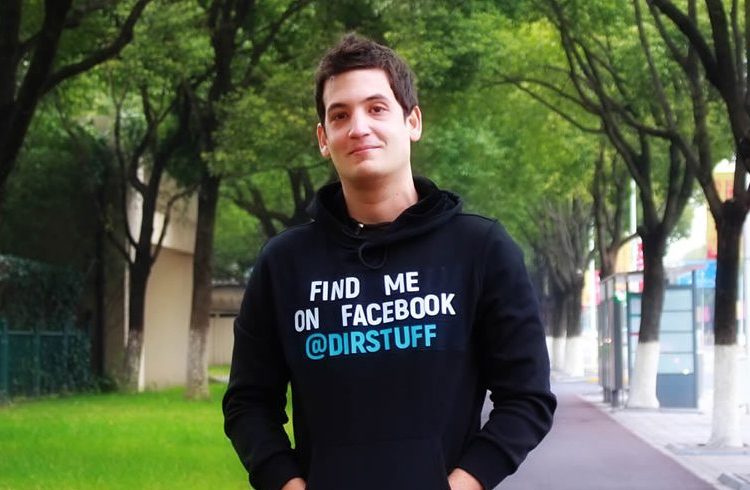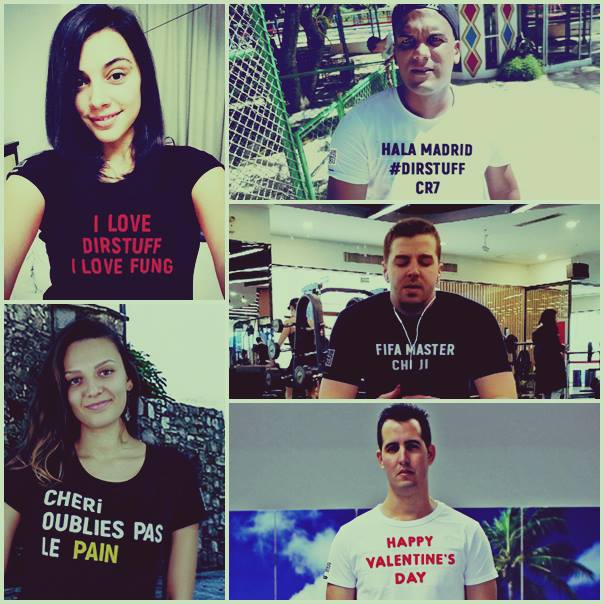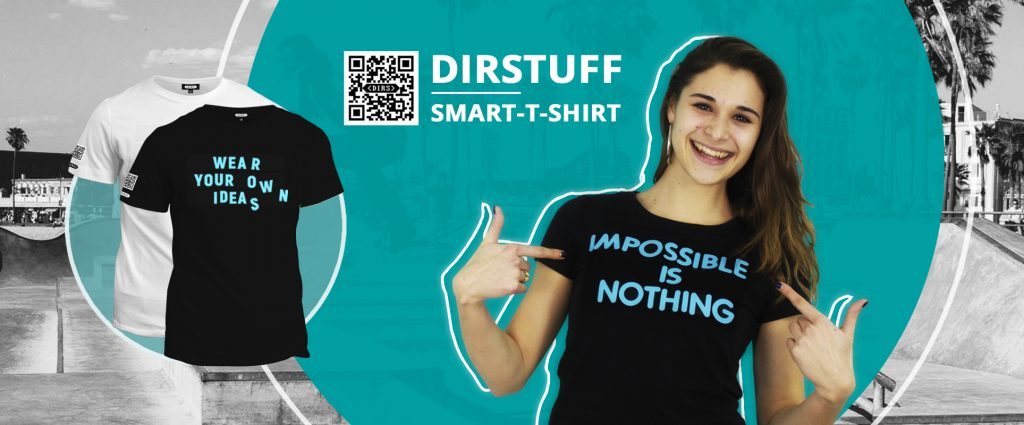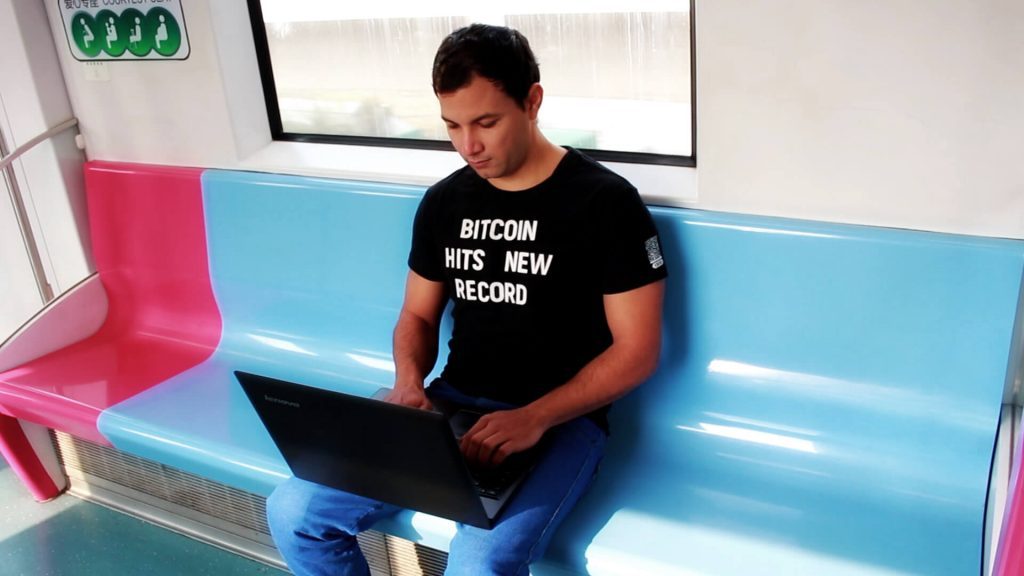“That all the friends share, that the rumor gets out, that the world finds out about the Smart-T-Shirt,” is what a 28-year-old Cuban wants today. He lives in China, from where his grandfather got to the island many years ago, like any other emigrant, to pave the way.
Today it is the grandson, Juan Pablo Fung, who has sought an economically more prosperous environment and from where he has been able to imagine and make come true a business that is, above all, a great incentive for the imagination.
“I had this idea three years ago; to create my own brand of smart clothes. To give human beings one more tool to express themselves. I’ve worked and suffered a great deal to be able to make it come to fruition. It’s not easy to be an entrepreneur; it’s absolutely not easy to be a Cuban entrepreneur.”
This is how Fung presented the leader product of his Dirstuff enterprise: a T-shirt that each one can personalize by attaching letters on it, making their chest (or back) a tailor-made space to proclaim their own messages.
Let’s start by breaking down that phrase “first smart T-shirt made by Cubans” which appears in the promotion you are making on the Internet.
This is a unique product, not just is it the first of its type because it is innovative and because it accomplishes, in a very simple way, joining fashion and technology to increase the capacity of expression of users, or making it easy for them to be able to promote themselves or a certain organization, enterprise or group they represent, online or offline. In addition it is a product exclusively made by Cubans, which also makes it special.
It was a dreamed by a young Cuban three years ago, and for lack of economic resources he had to postpone it and work on other projects to guarantee getting those resources. It was designed by Cubans whose age range is 20 to 70 years, like my grandmother, who was always listening and contributing ideas.
The first totally functional prototype was produced, by hand and with no previous experience, by a couple of my friends (Laura and Javier). The web application was developed by a group of talented young people, also Cubans. The success of the campaign we are now launching on the social media is impossible without the backing of all the Cuban friends, who even without personally knowing each other feel identified with the team and would like to see the dreams of their compatriots come true.
And lastly, it is Cuban because of the Cubans’ need to express themselves; and the way in which they exercise that right is very distinctive if compared to Asia, Europe and even to other countries in the Americas.
Cubans are extremely talkative, communicative, expressive, they speak with the body, gesticulate, make faces, turn their eyes. It’s not necessary to give many examples of the signs in Cuba; everybody has taken a private route taxi with an endemic, autochthonous message like: “To speak of me…anybody, to be like me…impossible.” Or something more suggestive and intelligent like: “Forbidden to talk about the thing.”
I could talk to you about the signs in the agricultural markets, of those truck and bus drivers place on their windshields, those in the countryside, the bicycle taxis…Cubans are undoubtedly a walking exclamation point.
And what is a smart T-shirt?
A smart T-shirt is the one I have on, which can change its message each time users decide they need an update, which can best reflect or best represent the users, making them more exclusive. It is a T-shirt that will show a phrase as intelligent and creative as the users are capable of thinking of. It is also a smart T-shirt because it allows users to share unlimited digital information with the persons surrounding them.
Through the T-shirt it is possible for another person to get all the users’ contact information, their telephone number, their email, their name, job…in just a question of seconds, as long as they wish to do it. In addition to those functions, you can make payments through the T-shirt; on the video you see a young man selling coffee and another paying him through the QR code on the sleeve, which obviously facilitates the time and effectiveness of the transaction. Some could think that our T-shirt is not as smart as in the science fiction movies, but I’m convinced that at least it “is not foolish.”
Made in Cuba?
No, unfortunately it isn’t. Producing in Cuba is a big dream, the most beautiful one that a young entrepreneur from the island could have. I would give anything to produce in Cuba, to create jobs, to give free rein to the imagination of recently graduated talents or even students from the ESTI…the ESTI graduates are the best in the world and no one in any continent would dare deny this. The garment industry has been left way behind on the island, and that has to be resolved because Cubans have many hands. When I see foreign-brand name guayaberas, which I am not going to mention, at extremely high prices, in mycountry’s shop windows…I would like to disappear from the face of the earth, because that could be made in Cuba, by Cuban grandmothers and mothers, with very good quality and at much more competitive prices.
Made for Cubans?
Yes, of course. Made for persons of all nationalities and ethnic groups to use them and exploit them. But above all made for myself, a Cuban, for all of my Cuba and for everyone to have another argument, no matter how small it is, which shows that we Cubans are the chalk; that we are as good as or better than the others; that we are used to facing great obstacles and not giving up. If I had been born in Switzerland, I would have finished this project in just a few months, perhaps days. Since I’m Cuban, it took me three years, but there’s a Chinese saying that says: The flower that is born in diversity…is the rarest and most beautify of all. Martí even said so in an even more beautiful way: “Give me the yoke, oh my mother, so that, standing in it I best display on my forehead the star that shines and kills.”
“A fashion revolution and freedom of expression.” Is this more than a slogan to have an impact?
This is not a phrase made to sell. We really want to start a revolution. We want to struggle for people to express themselves more freely through fashion. The more cultured and intelligent persons are, the greater the effort they make to pass on their own messages, their own values.
Imagine a T-shirt that will always make you feel unique, different, genuine, a T-shirt for each occasion. Imagine a T-shirt you put on in the morning to go to university and you wrote a message on it that says: “I hate exams but I love my teacher.” Later at 10 am you see a crazy politician threatening to drop atom bombs at the height of 2018, you change the message you have and you write: “Make coffee not war.” It’s 2 pm and you hear Pink Floyd on your headphones full blast in public transportation, your T-shirt says: “Another brick in the wall.” A handsome young man approaches you, smiles and scans your QR code. He’s also going to the concert in the evening. You know it because you’ve already added yourselves on all the social media. When the concert ends in the evening and you’re having dinner together…your T-shirt says: “This is not a date.” Of course, the latter is just a cliché; this T-shirt is also a weapon.
They are letters attached to the fabric. What happens when it’s washed?
The letters don’t fall off unless users decide to change them. The hooks and loops we use are high technology, they were previously designed for high-risk medical material, and they are very resilient. The letters do not easily lose their shape or wear out. And the T-shirt can be washed without any problems.
How does the insertion of the Quick Response code work? Could this be useful in Cuba considering the little connectivity that still exists?
The QR is a very simple and useful technology; it makes it possible for the person who scans to go to a certain URL for which the code was created. In Cuba at present there is little connectivity, but it is expected that by the end of the year there will already be enough Internet on cell phones. Internet is a need, the Cuban economy cannot grow without opening up to the world, education cannot develop and improve without Internet. We train very high caliber professionals in the University of Havana, in the CUJAE, in the University of Las Villas, in the UCI…afterwards we see them go to work in Uruguay, in Spain and in any company in the world because there are no conditions in Cuba. It’s absurd to train that amount of professionals if there isn’t going to be work or a framework for them to innovate. This sector is very interesting, the computer scientists and the technology professionals don’t need many resources to produce; five kids with five laptops in a rented house with minimum conditions can develop an application that is worth thousands of dollars. The Cuban government should take advantage of this, it should create the conditions for these young people and instead of being called non-agricultural cooperatives, full of restrictions, they should be called software enterprises, with reasonable taxes and incentives that allow for the investment of foreign capital directly to those enterprises. I hope that with the arrival on Internet on cell phones there will also come more policies that promote an activity that can be so important for our country.
How much do the T-shirts cost? How can people have access to them?
The T-shirts will soon be launched on the Kickstarter platform. They cost 35 dollars with the shipment included to any part of the world. However, we will sell the first 300 at 30 dollars for promotion. Yes, 30 dollars is a very high price for Cubans on the island, but for the time being neither does the possibility of selling them in Cuba legally exists, nor making large shipments to our country, which is why marketing them in the place that saw their birth is still impossible. In the future I expect to sell them in Cuba and lower much more the price.
The T-shirts are not expensive if you compare them to others on the market, where any Hollister T-shirt costs the same and has only one printed message, which, if you’re not lucky, you will go to a party and there are three persons wearing the same thing as you.
What specific challenges do you face as a Cuban entrepreneur?
The challenges have been tough, frustrating. From not being able to launch the product in different platforms that don’t accept Cubans, to not being able to open an account in a bank, not being able make payments to partners and suppliers with a Visa or Master card. We had to move part of the team to China, where the cultural differences are enormous, to be able to guarantee the production.
Which are your next steps in this business?
We are asking all our friends on and outside the island for help. We need their help to publicize this project on the social media and the means of communication. We have sufficient capital to produce the T-shirts, but we want to continue lowering the costs and the final price, but the marketing is the most difficult part. That’s why we are also trying to hire Cuban artists and personalities who feel identified with our idea and who could collaborate with us, even as partners in this adventure.
I believe the future is very promising. Although I’m very optimistic, until a few days ago I had some uncertainties. However, after seeing the reaction of so many persons of different nationalities, of so many Cubans in all parts of the world supporting the idea, sharing the posts, sending so many messages of encouragement…I no longer have doubts that this boat already set sail. I can even say that the team is already growing. Developers and designers of the highest level have already joined us, which allows us to very soon start developing the 2.0 version of the T-shirt. When I say “of the highest level,” I’m referring to Cuban professionals who in the Tech Giants could be project leaders. For the time being, about the 2.0 version I can only say that it includes Increased Reality, that it includes the use of cryptocurrency. We want to continue struggling for freedom of expression and above all for the world to know the quality of Cuban entrepreneurs.













